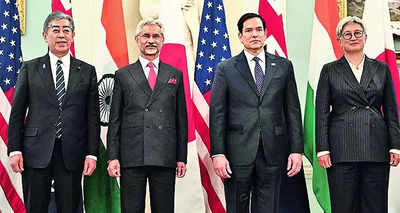NEW DELHI: Hours after the inauguration of US President Donald Trump, Quad nations sent out a clear message to China in the form of a joint statement, in which their foreign ministers strongly opposed any unilateral actions that seek to change the status quo by force or coercion.
While this formulation is not new, it’s significant, coming as it does amid fears in the Indo-Pacific about the potentially erratic nature of President Trump’s foreign policy that have been exacerbated by his recent courting of his Chinese counterpart Xi Jinping.
Timing of meet shows priority member-states attach to Quad: EAM Jaishankar
The Quad ministers, according to the joint statement, reaffirmed their commitment to strengthening a free and open Indo-Pacific where the rule of law, democratic values, sovereignty, and territorial integrity are upheld and defended. If there was any doubt about who these messages were intended for in the first meeting of the group after Trump’s return as President, Japan laid it to rest by specifically mentioning in its own readout East and South China Seas where China’s territorial claims remain a major source of friction.
“Our four nations maintain our conviction that international law, economic opportunity, peace, stability and security in all domains, including the maritime domain underpin the development and prosperity of the peoples of the Indo-Pacific,” said Quad joint statement. Significantly, it also committed to regular meetings between the foreign ministers and the proposed summit in India later this year.
“We are committed to strengthening regional maritime, economic, and technology security in the face of increasing threats, as well as promoting reliable and resilient supply chains,” said the joint statement.
The timing of the Quad meeting is especially significant for countries like India and Japan as it suggests the Trump administration, the President’s recent overtures for a deal with China notwithstanding, will remain committed to working jointly with other partners in a way that could blunt Chinese aggression. Jaishankar said that the timing underlined the priority that member-states attach to Quad. “The meeting today sends a clear message that in an uncertain and volatile world, Quad will continue to be a force for global good,’’ he said in a post on X. PM Narendra Modi had described Quad as a force for global good, participating in the first in-person summit in 2021.
While Quad was upgraded to the summit level under Trump’s predecessor Joe Biden, Trump is credited with reviving the mechanism under his first term as President. The Quad officials met for the first time in 2007 but it was only in 2019, on the margins of UNGA in New York, that the foreign ministers met for the first time. Speaking on Trump’s concerns about alliances and burden-sharing, Jaishankar had said last month these don’t apply to Quad as “everybody pays their fair share’’.
Quad sees itself as harnessing the collective strengths and resources of Australia, India, Japan and the US, from govts to the private sector to people-to-people relationships, to support the region’s “sustainable development, stability, and prosperity by delivering tangible benefits to the people of the Indo-Pacific”. So it’s like everybody goes for dinner and you split the bill, and everybody thinks it’s the right thing to do,’’ Jaishankar had said.




